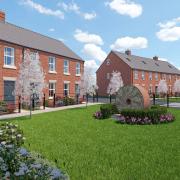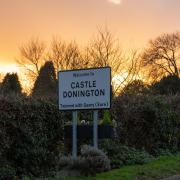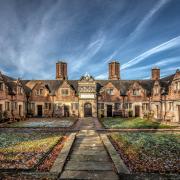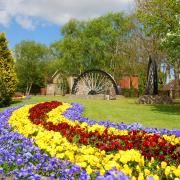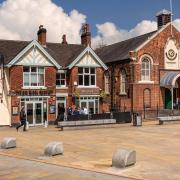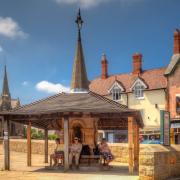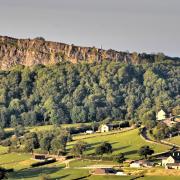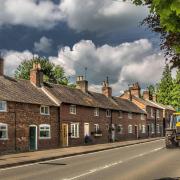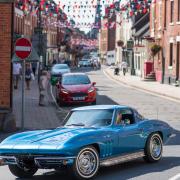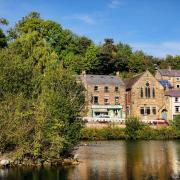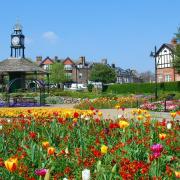Part one of Ashley Franklin’s road trip along the A517 from Belper to Ashbourne

A drive along the A517 – 11 miles linking Belper with Ashbourne – is a salutary reminder of my fondness for this area, where I live close by. At either end sits historic mill town and market town. In between, the history stretches back beyond even times’ mists: this is the road that cuts through what was known as the Duffield Frith and it’s as ubiquitous today as the heritage of Strutt and Shrovetide.

The Frith (Celtic for ‘forest’ or ‘game preserve’) was the royal hunting ground where deer ran, wild boar roamed and wolves howled. The countryside hereabouts is still abundant and verdant and one can see the Frith’s other enduring feature: its dense woodland interspersed with stretches of open countryside where farms grew up.

This is still agricultural land – farmer’s daughter Jean Redfern of Hulland Ward recalls cows being herded along the main road as late as the 1950s. As it was, Jean recalls only three villagers owning a vehicle, so one was more likely to hear a cowbell than a car horn. The 60-plus farms and smallholdings in the locality at that time subsequently dwindled; there are now around 20. Concomitantly, car traffic has grown along the A517 – a telling reminder are new signposts announcing Hulland Ward as ‘the gateway to Carsington Water’ – yet for a road linking two busy towns, the A517 can often feel like a B-class country lane. While the villages on and around this road have grown, most of them were small to start with, and many of them – such as Shottle, Cross O’th Hands, Atlow and Bradley – are still small, snug and secluded. There remains a pleasing rurality to this region.

My first port of call, just beyond Belper’s North Mill, is all green peace and quiet in stark contrast to the Strutt’s roaring weir on the other side of Derwent Bridge. Peter Davies, local recipient of an MBE for his ‘services to the community’, has singlehandedly returned a neglected overgrown site to its former glory as a cottage hospital garden. Appropriately, it’s called Beaurepaire, not only the French for ‘beautiful retreat’ but also the old name for Belper.
Peter visibly glows with pride as he points out 70 dedicated areas – benches, beds, sculptures, water features – that have helped pay for Beaurepaire’s upkeep since it opened in 2005. Remarkably, in spite of the garden’s rich, colourful growth, Peter is no gardener. ‘I needed a low maintenance garden designed around ease of use,’ he explains. ‘All that you see has evolved naturally.’ One notable man-made construction is a miniature railway track which Peter hopes to put to steam in time for Beaurepaire’s tenth anniversary next year.
Although this beautiful retreat is well away from Belper’s shopping streets, the interior and accessories store Lavender grey sits in splendid isolation over the road. ‘We are a hidden gem,’ says co-owner Kristian Berresford-Hemmens, ‘and word of mouth has brought us many valued customers.’ Along with healthy sales of its distinctive shabby chic, Kristian and Lavender grey’s founder Lucy Coulthard run a successful interiors business offering designs of ‘originality, beauty and flair.’
Next to Lavender grey in what was once a dairy farm is the family-run Talbot Hotel where, along with its pub and six rooms is the Italian restaurant Armando’s where my wife Francine’s expensive tastes once led to her dining on the finest Dover sole this side of the English Channel.
Before driving off up Bridge Hill, I walk up to see the eye-gladdening views the hillside houses here command, not only of Belper’s mill complex but also the steeples of both St Peter’s and the Congregational Church. I flush with pride knowing I live in one of the most significant of the 981 World Heritage Sites.
Once in the car and over Bridge Hill, the rolling green of The Chevin and Dalley Lane fields stretches away on either side. Farnah Green to the left takes you to the Bluebell Inn, a cosy pub restaurant where Francine and I recently enjoyed succulent, perfectly-cooked sirloin steak from a menu brimming with classy dishes.
It’s pertinent that in and around the whole stretch of the A517, virtually every pub, post-smoking ban, is open. Carsington Water has been a help but it’s also due to Derby and Belper dwellers knowing that they don’t need to travel as far as the Peak before they are enveloped in deep countryside.
Furthermore, as the website for Shottle-based country house hotel Dannah Farm reveals, this is a ‘walker’s paradise’ where you can ‘walk the local footpaths, take in the stunning scenery and not see another person all day.’ It also points out the wealth of wildlife hereabouts, notably breeding birds and birds of prey, and abundant wildflowers. Driving betwixt Turnditch and Hulland, I gaze on the panorama of Ecclesbourne Valley and the dales beyond and wonder why this southeast edge of the Peak isn’t promoted more vigorously.
This countryside on Derby’s doorstep is also a reason there are two flourishing wedding venues by the A517: Blackbrook House and Shottle Hall. I have photographed a wedding at both country houses and found each one intimate, individual, elegant and opulent. Shottle Hall particularly promotes its picture-perfect location with four acres of landscaped gardens and 14 acres of parkland; it’s also a luxurious hotel. Blackbrook House, winner of the 2009 Wedding TV Best British Wedding Venue award, also emphasises its reputation for exquisite food and staging dining events. Recently, it opened a delicatessen. ‘With Blackbrook village putting up with us for 13 years, we wanted to give something back to the residents,’ smiles managing director Lavinia Lewis, ‘so locals can just walk up the road and pick up meats, pastries, cakes, homemade jams and chutneys and our beautiful Blackbrook made breads plus vegetables and dairy items. Having this community hub is lovely as we have seen so many villagers we haven’t met before.’
The deli has also brought many people to the house for weekday dining, and has inspired a series of cookery courses and food talks and demonstrations.
There is always an expansive menu up the road in The Hanging Gate, a traditional, beamed low-ceilinged gastro pub where you can opt to luxuriate in the lounge on a sofa, or dine on the rustic pine tables. When it’s warm, there is a sizeable beer garden. Francine and I have dined there at least a dozen times and all the dishes have been excellent, and the staff polite and personable.
There are also rustic pine tables at The Cross Keys in Turnditch, beautifully designed and built by Henry’s of Brailsford. We used to dine here regularly before it declined and closed so we are delighted to see the pub thriving again under Stuart and Sarah Yates. Resurrecting a pub in these times is risky but, as Sarah reveals, ‘Ideas, enthusiasm and putting in the hours, all paid off’, bringing them a Best Newcomer runners-up prize in this year’s Derbyshire Food & Drink Awards. Key to their success, says Sarah, is: ‘employing staff who care and make a customer feel special; a seasonal change of menu; traditional pub food with a modern twist – chef Stuart is from a rosette background so has a talent for an artistic dish – and unique food evenings.’ They have also refurbished their function room which they hope to open soon as an overspill dining area.
One of those special evenings is Steak Night where local butcher Anthony Andrews personally flame-grills the meat on a block. Actually, Anthony is more than ‘local’: his shop is in the same building as the pub, which could be unique to this country; and, in an age where rural butchers have disappeared, Anthony’s business, now three years old, could also be unique in opening anew in a village.
‘Some villagers thought I was mad to open here,’ recalls Anthony, ‘but they and other local people have supported me well; and this is a great location on the A517 as I receive a lot of commuter custom.’ Anthony has since expanded into deli produce, and his texting delivery service – with 250 customers – won him the National Butcher’s Shop of the Year Innovation Award in 2012.
Unsurprisingly, Anthony provides The Cross Keys with all its meat. ‘It couldn’t be more local and fresh,’ he points out.
‘It works perfectly for both parties,’ says Sarah, ‘because if our customers enjoy a meat dish, they pop next door to buy some for themselves.’
The other change to the Turnditch I wrote about in Derbyshire Life ten years ago is that the railway lines under the village bridge are crackling again through the re-opening by the Ecclesbourne Valley Railway of the Wirksworth to Duffield line. Better still, Shottle Station by the bridge has been rebuilt by the volunteers and will be open sometime this summer, especially welcoming news for the adjacent Railway Inn, which is also thriving again, not least because of its ‘Carvery Heaven’.
At the other end of Turnditch, the Tiger roars on as both a dining and drinking den, with the same fabulous views from the veranda. In the heart of the village, one should always slow down near the school not only for the obvious reason but also to admire Derbyshire’s most handsome school frontage with its dovecote tower and John Smith of Derby clock. Ten years ago on my last visit, I found the primary school’s ethos to be as time-honoured as its building with the headteacher of 25 years’ standing, Michael Halls, telling me that ‘adults once at this school can drop back and feel that it’s not far removed from what it was like when they were here.’ Michael moved on three years ago, and current Head John Bolton declared that ‘we still have a traditional, family ethos whilst striving for higher academic achievement... and we still have lovely staff.’
The school also retains its association with the parish church which is directly opposite. The other significant community involvement is with the annual Turnditch and Windley Show, where last September the 900 plus entries and 4,000 attendance – both a record – are a remarkable testament to two villages of around 500 inhabitants.
Windley itself is a quiet, picturesque village, hidden away on a steep country lane running parallel to Turnditch. Like Turnditch School, time has in some respects stood still in these parts. A resident told me one can still find white violets growing by the roadside, as mentioned by a villager in a late 19th century reminiscence.
The largely unspoilt nature of the landscape hereabouts is reflected in the feted mid-20th century paintings of Douglas Bliss, who came to live in Windley in 1946. His daughter Rosalind still lives there, a painter herself, though more occupied these days with her beautiful garden; bountiful, too, as flowers, fruit and vegetables grow to an extraordinary size. ‘There must be something in the soil,’ says Rosalind.
Also in Windley, arable and dairy farmer John Bryer has been working the soil for over 50 years. Although his son Charlie – the fourth generation of Bryer farmers – has effectively taken over the farm, 78-year-old John still rises at six and puts in a shift. ‘I’m a man of the open air,’ he declares, ‘and when you’re out in the tractor and take in the views, you feel there’s no better life.’




